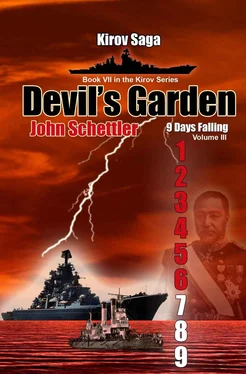John Schettler - Devil's Garden
Здесь есть возможность читать онлайн «John Schettler - Devil's Garden» весь текст электронной книги совершенно бесплатно (целиком полную версию без сокращений). В некоторых случаях можно слушать аудио, скачать через торрент в формате fb2 и присутствует краткое содержание. Жанр: Альтернативная история, на английском языке. Описание произведения, (предисловие) а так же отзывы посетителей доступны на портале библиотеки ЛибКат.
- Название:Devil's Garden
- Автор:
- Жанр:
- Год:неизвестен
- ISBN:нет данных
- Рейтинг книги:3 / 5. Голосов: 1
-
Избранное:Добавить в избранное
- Отзывы:
-
Ваша оценка:
- 60
- 1
- 2
- 3
- 4
- 5
Devil's Garden: краткое содержание, описание и аннотация
Предлагаем к чтению аннотацию, описание, краткое содержание или предисловие (зависит от того, что написал сам автор книги «Devil's Garden»). Если вы не нашли необходимую информацию о книге — напишите в комментариях, мы постараемся отыскать её.
Devil's Garden — читать онлайн бесплатно полную книгу (весь текст) целиком
Ниже представлен текст книги, разбитый по страницам. Система сохранения места последней прочитанной страницы, позволяет с удобством читать онлайн бесплатно книгу «Devil's Garden», без необходимости каждый раз заново искать на чём Вы остановились. Поставьте закладку, и сможете в любой момент перейти на страницу, на которой закончили чтение.
Интервал:
Закладка:
A courteous man, he was keenly aware of the concept of “face” and might often turn his head at a breach of conduct, relating his displeasure quietly, behind the scenes, in an effort to allow the offender the means of recovering face and doing what was correct. At other times all it ever took was a turn of his head to take notice of an offense, and the men responsible would soon be earnestly working to remedy their behavior.
When war came with Russia in 1904 Togo rose to the challenge with the same quiet dignity and sense of purpose. He was keenly aware of the fact that the responsibility for Japan’s entire navy rested upon his shoulders, one that was built by long years of energetic work, with many ships acquired from foreign manufacturers or taken as prizes of war when Japan fought China. It was, to him, like an irreplaceable sword, beautiful and deadly, yet one that might be broken if mishandled in combat, for he knew all too well the destructive power of modern weapons and war in general.
When he trained his men and ships, he endeavored to infuse the exercise with as much realism as possible, preferring live shot to dummy rounds in any test of cannon. Time in battle was a brief, violent affair, but time to prepare for battle was endless. When battle came, one had to be bold and aggressive, but to move with predetermined calculation, and so he was given to write long multi page battle orders assigning position, speed and formation for each division of his fleet.
When war was declared it was his intention to become swift master of the seas between Japan and the great European adversary that many thought would prove an insurmountable foe. He would not let this enemy come from the sea. It would be found at sea and opposed there, and once Japan had defeated the Russian Pacific Fleet, then they could lie in wait should any reinforcements be sent from the Baltic, which is exactly what happened.
Togo saw the capture of the first Russian ship in that war as a fateful omen, and often mused on the hand divine providence might have played in those events. The ship was, in fact, named Russia , and his crew gleefully related that they had “taken Russia by storm” when they secured the prize.
In his first action against the Russian fleet near Port Arthur, Togo kept the range well open, at 8,000 yards, which was considered good range for naval action at that time. The superior gunnery of his ships paid off well, and he sustained very little damage from the enemy while inflicting far more serious losses. His precious fleet had been protected, even as it was used to good effect to win the battle.
Later, when he met the Russian reserve fleets in the Strait of Tsushima, his command to the fleet was weighted with the importance of that imminent battle: “The rise or fall of the Empire depends upon the result of this engagement. Do your utmost, every one of you.”
When the fighting began, he remained on the open air bridge, refusing to shelter in the conning tower much to the distress of junior officers at first. Yet, through shot and shell when the enemy concentrated fire on his flagship Mikasa , he was never scratched or wounded in any way, which endowed him with an aura of invincibility. Such notions were far from his own mind, humble man that he was, but to his subordinates the light of a demigod soon seemed to surround him, and they came to revere him as the great hero he became.
It was not simply the fate of Japan that was at stake in that war, but of Imperial Russia itself as well. Beyond that, the battle opened the door to Japanese expansion in the Pacific that would not end until men like Chester Nimitz, Bull Halsey, Ziggy Sprague, and a host of other brave and determined officers and sailors, defeated Japan completely in WWII. But those event were far off and unseen by anyone alive that day in the Straits of Tsushima. It was a grand battle, and an even grander victory for Japan and the quiet Admiral that led the fleet to glory that day.
Historians have selected three great Admirals of the world naming Horatio Nelson of Great Britain, Togo as the ‘Nelson of the East,’ and Chester Nimitz, who revered Togo himself, and assiduously studied his planning and tactics.
This was the “little man” Karpov was sailing south to find and confront, as different from his own character as day is to night. When Togo stood in the aura of invincibility on the bridge of the Mikasa at Tsushima he did so with bravery, inner resolve, and with a feeling he was fated to succeeded there, that he was, indeed, a fortunate man and favored by the Gods.
Yet now another man who also thought himself invincible was bearing down on the coast of Japan like a threatening storm-Vladimir Karpov. Togo’s virtue of quiet humility, and sense of honor seemed entirely lacking in Karpov. In their place was hubris, arrogance and a willful aggressive nature that had little regard for the lives or fate of any who might dare oppose him.
He commanded a single ship, yet one that had challenged entire fleets composed of fast, well armored warships supported by aircraft carriers and thousands of planes. He had confronted every enemy who opposed him with unrelenting power, and in many ways he was successful in defeating his opponents at every turn.
He had held off the Royal Navy in the Atlantic and roundly smashed the hapless American fleet that had sailed into his path, unaware of the danger he posed. In the Mediterranean Sea he had frustrated the Italians, beating a pair of their finest battleships, and then took on Rodney and Nelson to prevail in battle yet again. In the Pacific he had bested Admiral Hara’s carrier division, left Sanji Iwabuchi stranded on a coral reef in the battleship Kirishima , and dueled with the mightiest ship Japan would ever build, and one of her most famous Admirals, Isokoru Yamamoto. Then after returning to his own era, he used his cunning and aggressive tactics to surprise and nearly sink Captain Tanner’s CVN Washington , fending off the American 5th Fleet in the process.
His own crew had also come to see their Captain as invincible, even in the face of overwhelming odds when the ship returned to 1945 and was faced by sixty ships and a thousand American aircraft. They saw Karpov as a fighting Captain who would do whatever was necessary to protect the ship and prevail against the enemy. Whether Kirov would have survived subsequent engagements with the American fleet, either in 2021 or 1945 was not something they considered. What they did know is that the ship did survive, no matter what the odds, and each time it was Vladimir Karpov in command of the battle. Now both men would face one another, Togo and Karpov, and the winner would decide the course of history from that day forward.
It was not long before word of the incident in the north reached Admiral Togo. It was coming to him now, even as the rider climbed higher, his horn still calling out alarm.
Togo had been supervising Japan’s newest port on the coast north of Osaka at Maizuru. It had been built to provide them a base to keep a wary eye on Vladivostok and quickly get ships into the Sea of Japan without first having to sail around the big southern islands or through the narrow Straits of Shimonoseki. Before the war Maizuru had been an isolated coastal town, with only slow road connections to the big cities to the south. Now, however, the rail line was completed, and supplies flowed easily to the port.
He had been hunting that day, dressed in his old clothes and wandering about the hills with a rifle and a pair of faithful hunting dogs. Returning in the evening he heard the call of a distant horn, growing louder as he descended the hills to the port below. It was not long before he saw a horseman with a uniformed messenger, his dogs barking fitfully as the rider came up.
Читать дальшеИнтервал:
Закладка:
Похожие книги на «Devil's Garden»
Представляем Вашему вниманию похожие книги на «Devil's Garden» списком для выбора. Мы отобрали схожую по названию и смыслу литературу в надежде предоставить читателям больше вариантов отыскать новые, интересные, ещё непрочитанные произведения.
Обсуждение, отзывы о книге «Devil's Garden» и просто собственные мнения читателей. Оставьте ваши комментарии, напишите, что Вы думаете о произведении, его смысле или главных героях. Укажите что конкретно понравилось, а что нет, и почему Вы так считаете.












